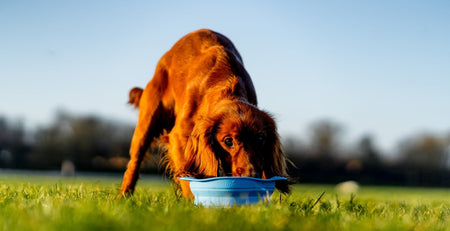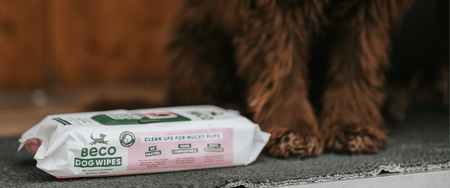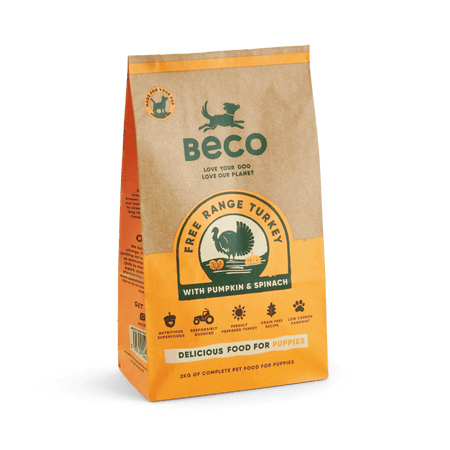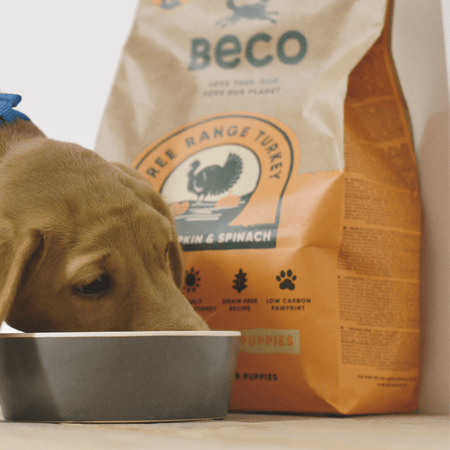Key Takeaways
Fibre plays a significant role in the digestive health of your dog, from promoting intestinal health to supporting nutrient absorption.
Broccoli and chia seeds are both notably high in fibre, making them both ideal ingredients to include in your dog’s food.
Dogs require a diet with between 2-4% fibre.
Your dog may need more fibre if they are suffering from constipation, frequent vomiting, weight gain, or poor coat condition.
12 Best Sources of Fibre for Dogs
1. Broccoli
Broccoli is not just a high-fibre food; it's also packed with vitamin C, vitamin K, and minerals like potassium and manganese. These nutrients support the immune system, bone health, and overall wellness.
The fibre in broccoli aids in digestion and can help prevent constipation in dogs. It's also beneficial for dogs needing to manage their weight due to its low-calorie content.
Broccoli is an easy veggie to introduce into a dog's diet, as it is often found in dog foods, such as our Wild Boar with Broccoli & Carrots. It can also be served both raw and cooked, but always keep it free from additional “human” ingredients, such as salt or butter.
Key Benefits:
Supports digestive health
Enhances immune function
Promotes bone strength
Aids in weight management
2. Chia Seeds
Often referred to as a superfood, chia seeds are packed full of fibre as well as omega-3 fatty acids, antioxidants, calcium, phosphorus, and magnesium. These nutrients work to promote cardiovascular health, support strong bones, and aid in digestion. Chia seeds also work to regulate blood sugar levels and even have skin and coat benefits.
An excellent source of both soluble and insoluble dietary fibre, they can help to regulate their digestive system, and even relieve constipation. As Drs Nick and Conor of Raw Pet Medics discuss “You have to have some insoluble with some soluble fibre. The insoluble is a mesh that keeps everything where it needs to be. Chia seeds have a balance of both”.
Chia seeds are also an easy food to incorporate into your dog’s diet as they can simply be sprinkled over the top of a meal. Alternatively, soak them in water and use them as a meal topper.
Key Benefits:
Supports cardiovascular health
Source of soluble and insoluble fibre
Aids in digestive health
Regulates blood sugar levels
3. Carrots
Carrots are a crunchy, tasty source of dietary fibre and beta-carotene, which the body converts into vitamin A. This nutrient is essential for good vision, immune function, and skin and coat health.
Carrots are also rich in antioxidants, which help protect the body against free radicals. Their natural sweetness makes them a favourite among many dogs, and they can help in dental health by cleaning teeth as they chew. If your dog is suffering from diarrhoea, you can give carrots as the added fibre can add some bulk to loose stools.
Key Benefits:
Boosts eye health
Supports skin and coat condition
Promotes dental health
Acts as a low-calorie treat
4. Flaxseed
Flaxseed is a superfood for dogs, offering a healthy dose of fibre, omega-3 fatty acids, and lignans. These components can improve skin and coat health, reduce inflammation, and support cardiovascular health. The fibre in flaxseed promotes regular bowel movements and can help with weight control. When adding flaxseed to your dog's diet, ensure it's ground or in oil form to aid in digestion.
Key Benefits:
Improves skin and coat health
Reduces inflammation
Supports heart health
Helps in weight management
5. Kale
Kale is a nutrient-dense vegetable that provides dogs with fibre, vitamins A, C, and K, calcium, and antioxidants. These nutrients support vision, immune health, bone density, and may protect against certain cancers. Kale's high fibre content aids in digestion and helps keep the gut healthy. However, it should be given in moderation to avoid causing gas or stomach upset.
Key Benefits:
Enhances immune and vision health
Promotes bone density
Supports digestive health
May protect against cancer
6. Pumpkin
Pumpkin is highly regarded for its high fibre content, essential vitamins like A, C, and E, and minerals such as potassium and iron. These nutrients support vision, skin, coat health, and immune function.
Pumpkin's soluble fibre content can help with both diarrhoea and constipation, making it a versatile addition to a dog's diet. It's also low in calories, aiding in weight management. Smaller breed dogs may only need about a tablespoon, while larger breed dogs can have up to a cup.
Key Benefits:
Regulates bowel movements
Supports vision and immune health
Promotes skin and coat condition
Aids in weight management
7. Apples
Apples provide a good source of fibre, vitamins A and C, and antioxidants. These nutrients support the immune system, dental health, and can help reduce inflammation. The fibrous texture of apples also helps clean teeth and freshen breath.
Apples are a suitable snack that both adult dogs and puppies can eat. You will need to ensure you have removed the seeds and core before offering them to your dog, as the seeds contain cyanide, which is harmful in large quantities. Stick to 1-2 slices of apple a day as excessive consumption can cause stomach upsets.
Key Benefits:
Supports dental health
Boosts the immune system
Reduces inflammation
Cleans teeth and freshens breath
8. Green Beans
Green beans are a healthy, low-calorie snack rich in fibre, vitamins C and K, and manganese. They can help maintain a healthy weight and support the digestive system. Green beans are also beneficial for heart health and can provide an energy boost due to their iron content.
Although they can be served raw, or canned, steamed green beans are the best way to prepare them for your dog.
Key Benefits:
Aids in weight management
Supports digestive health
Promotes heart health
Provides an energy boost
9. Cabbage
Cabbage is a great source of fibre, vitamins C and K, and antioxidants. These nutrients support the immune system, help with inflammation, and promote digestive health.
Cabbage can also help protect against certain types of cancer due to its antioxidant properties. It should be given in small amounts to avoid causing gas. When serving cabbage to your dog, it can be either raw or cooked, but free from butter or seasonings.
Key Benefits:
Enhances immune function
Supports digestive health
Reduces inflammation
May protect against cancer
10. Sprouts
Sprouts, including Brussels sprouts and bean sprouts, are rich in fibre, vitamins C and K, and antioxidants.
They support digestive health, boost the immune system, and can help reduce the risk of chronic diseases. Sprouts are also known for their ability to improve nutrient absorption due to their enzyme content. Serve them cooked and in moderation to prevent gas.
Key Benefits:
Supports digestive health
Boosts immune system
Improves nutrient absorption
Reduces chronic disease risk
11. Berries
Berries such as blueberries, strawberries, and raspberries are high in fibre, antioxidants, and vitamin C. These nutrients support heart health, immune function, and can help manage diabetes.
The antioxidants in berries also protect against free radicals and can slow the ageing process. Berries are a sweet treat that can aid in hydration and provide low-calorie nutrition, although you should exercise caution when giving these to your dog as they are also high in sugar.
Key Benefits:
Supports heart and immune health
Protects against free radicals
Aids in managing diabetes
Provides hydration and low-calorie nutrition
12. Sweet Potato
Sweet potatoes are a fantastic source of dietary fibre, beta-carotene, vitamins A, C, and B6, and minerals like potassium and manganese. These nutrients support immune function, promote healthy skin and coat, and aid in digestion.
Sweet potatoes are also beneficial for eye health and can help regulate blood sugar levels. They can be served mashed, baked, or boiled but should be peeled and free from any additional seasoning or added ingredients.
Key Benefits:
Promotes digestive health
Supports immune function and eye health
Aids in healthy skin and coat
Helps regulate blood sugar levels
Summary of Best Fibre Foods for Dogs
| Food Source | Fibre Content (approx.) | Key Nutrients | Primary Benefits |
|---|---|---|---|
| Broccoli | High | Vitamins C, K, Potassium, Manganese | Digestive health, Immune support, Weight management |
| Carrots | High | Beta-Carotene, Vitamins A, Antioxidants | Eye health, Skin & coat health, Dental health |
| Flaxseed | High | Omega-3 Fatty Acids, Lignans | Skin & coat health, Reduces inflammation, Heart health |
| Kale | High | Vitamins A, C, K, Calcium, Antioxidants | Immune health, Bone density, Digestive health |
| Pumpkin | High | Vitamins A, C, E, Potassium, Iron | Bowel regulation, Immune support, Weight management |
| Apples | Moderate | Vitamins A, C, Antioxidants | Dental health, Immune system, Reduces inflammation |
| Green Beans | Moderate | Vitamins C, K, Manganese | Weight management, Digestive health, Heart health |
| Chia Seeds | Very High | Omega-3 Fatty Acids, Calcium, Magnesium | Cardiovascular health, Strong bones, Blood sugar regulation |
| Cabbage | Moderate | Vitamins C, K, Antioxidants | Immune function, Digestive health, Reduces inflammation |
| Sprouts | High | Vitamins C, K, Antioxidants | Digestive health, Immune boost, Nutrient absorption |
| Berries | Moderate to High | Antioxidants, Vitamin C | Heart & immune health, Diabetes management, Anti-aging |
| Sweet Potato | High | Beta-Carotene, Vitamins A, C, B6 | Digestive health, Immune & eye health, Blood sugar regulation |
Why is Fibre Important to your Dog’s Diet?

Scientific studies have shown that there is a significant influence of dietary fibre on the intestinal function of dogs. Fibre plays a crucial role in modulating the gut microbiota, promoting intestinal health, and influencing nutrient metabolism and absorption.
Fibre-enhanced diets can also be beneficial in managing chronic diarrhoea in dogs thanks to its role in digestion and ability to bulk out loose stools. Fibre has also been found to have widespread systemic effects and myriad benefits throughout the body, beyond its role in gastrointestinal health.
Research has also demonstrated that various fibre sources, such as insoluble and soluble fibres, can be beneficial for dogs with gastrointestinal issues, and they can improve stooling behaviours and quality of life.
How Much Fibre Does a Dog Need?
Fibre is an essential part of a dog's diet, contributing to gut health and aiding in the prevention of bowel-related issues. The best amount of fibre needed can vary based on the dog's size, age, and health status. Typically, most dog foods contain the necessary fibre amounts; however, adding natural fibre sources can provide additional health benefits.
Dogs generally require a diet with 2.5% to 4.5% fibre. Too much fibre can lead to nutritional deficiencies and poor absorption of some minerals, so it's important to find the right balance. If you are unsure, consult with a veterinarian to determine the exact amount of fibre your dog needs.
Frequently Asked Questions (FAQs)
How can I tell if my dog needs more fibre?
Signs your dog may need more fibre include frequent vomiting, constipation, weight gain, and poor coat condition. Consult your vet for advice tailored to your dog's specific needs.
What is the best fibre supplement for dogs?
Whilst it is possible to get fibre supplements that are beneficial, such as Protexin, we believe natural sources such as broccoli, pumpkin, or chia seeds are the best fibre supplements for your dog.
How can I add fibre to my dog's diet?
Incorporating fibre-rich vegetables and fruits, such as the ones featured on our list, into your dog's diet or opting for a high-quality commercial dog food that includes these ingredients can effectively increase fibre intake.
Fibre Finale
Incorporating the right amount and type of fibre into your dog's diet is essential for their digestive health and overall well-being. Not only does it aid digestion but it also supports weight management and helps prevent diseases.
Choosing fibre-rich food sources such as broccoli, pumpkin, and chia seeds, will ensure you are significantly contributing to a balanced diet for your dog. Remember, while adding fibre, it's important to consider your dog's individual needs and consult with a veterinarian to ensure their diet supports their health optimally.
Shop our nutritionally balanced, fibre-rich dog foods here .
















